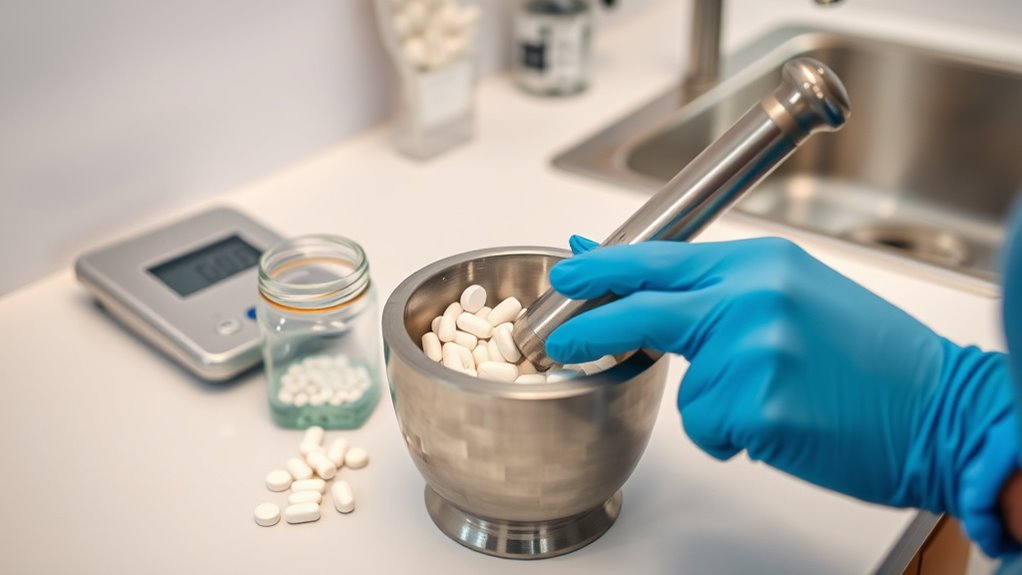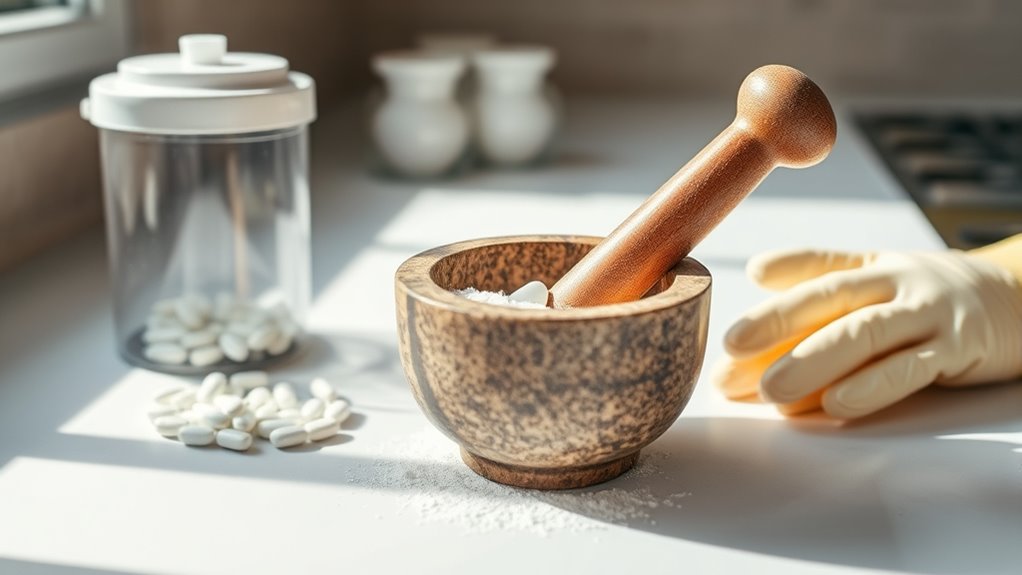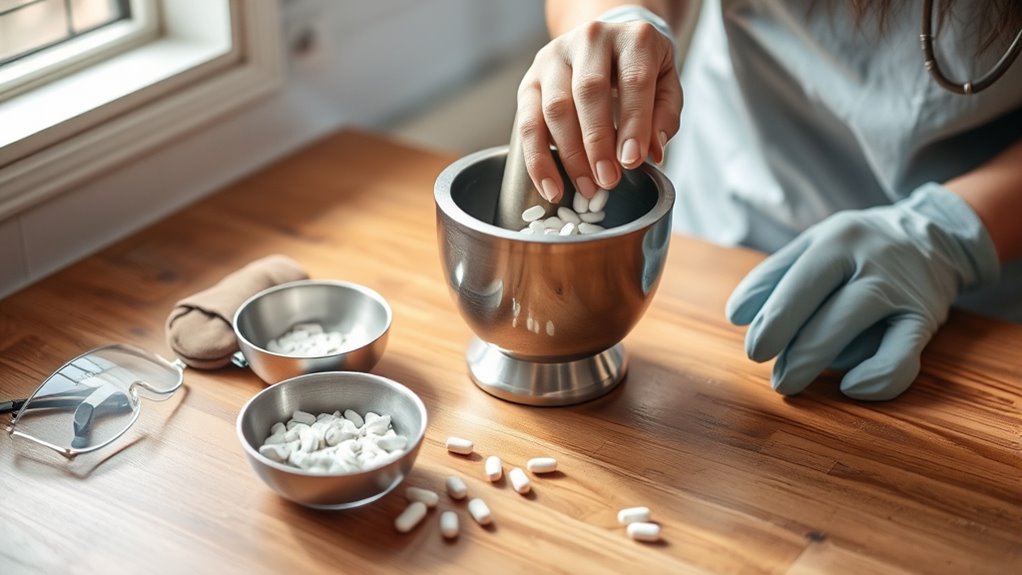When crushing pills, you should always verify it’s safe by checking if the medication allows it and following proper techniques. Use a clean mortar and pestle or pill crusher, wash your hands, and handle the medication carefully. Avoid crushing extended-release or coated pills, as it can cause harm. If you’re unsure or want safer options, consider liquids or dissolvable forms. Staying informed helps prevent health risks—continue to learn the best practices and alternatives available.
Key Takeaways
- Always verify with a healthcare professional before crushing any medication to avoid safety hazards.
- Use appropriate equipment like a pill crusher or mortar and pestle, and wash hands thoroughly beforehand.
- Do not crush extended-release, enteric-coated, or sensitive pills to prevent overdose or reduced efficacy.
- Consider alternative forms such as liquids, patches, or dissolvable tablets if crushing is unsafe or not recommended.
- Store crushed medication in a labeled, secure container and maintain a clean workspace to prevent cross-contamination.
Understanding the Risks of Improper Pill Crushing

Crushing pills without proper knowledge can pose serious health risks. You might unintentionally create crushing hazards that compromise medication safety. Some pills contain coatings or ingredients designed to protect your stomach or control release, and crushing them can lead to overdose or side effects. Additionally, certain medications become toxic or lose effectiveness when crushed. If you’re unaware of these factors, you risk damaging your health. Even simple mistakes, like crushing an extended-release tablet, can cause a dangerous dose of the drug to enter your system all at once. Understanding these risks helps you avoid dangerous errors. Prioritizing medication safety means knowing which pills are safe to crush and which aren’t, preventing unintended health complications. Consulting medication guidelines can provide clarity on whether a pill is crushable or not.
Safe Techniques for Crushing Pills Correctly

To crush pills safely, it’s essential to follow proper techniques that minimize the risk of errors or contamination. First, educate yourself about the specific medication, understanding its pill texture—whether it’s hard, brittle, or soft—to determine the best crushing method. Patient education is key; confirm with your healthcare provider or pharmacist if crushing is appropriate for that medication. Always wash your hands thoroughly before handling pills to prevent contamination. Use a clean, dry surface and a dedicated pill crusher or mortar and pestle designed for medication. Apply steady, even pressure to avoid crushing pills into uneven pieces or creating dust. Taking these precautions ensures safe, effective pill crushing while reducing the risk of accidents or medication errors.
Necessary Equipment and Supplies for Safe Pill Crushing

Having the right equipment and supplies on hand guarantees you can crush pills safely and accurately. For effective pill crushing, you’ll need a pill crusher or a mortar and pestle designed for this purpose. Use a fine mesh sieve or powder grinder if you need to achieve an even, smooth powder. Always have disposable gloves nearby to protect your skin and prevent cross-contamination, which is crucial for medication safety. A small, labeled container can help store crushed pills securely, reducing spills and mix-ups. Keep a clean, dry workspace and separate tools for pill crushing from other tasks. Proper equipment ensures you don’t compromise the medication’s integrity or safety, making pill crushing a safer, more controlled process.
Recognizing When to Use Alternatives to Crushing

Knowing when to choose alternatives to crushing is essential for ensuring medication safety and effectiveness. If your medication label advises against crushing or altering, don’t proceed with pill splitting or other medication modifications. Some pills are designed with special coatings, extended-release formulas, or are sensitive to crushing, which can alter their absorption or cause side effects. Always check with your healthcare provider or pharmacist if you’re unsure whether crushing is appropriate. If the medication is not intended for crushing or splitting, consider alternative forms like liquids, patches, or dissolvable tablets. Recognizing these signs helps prevent medication errors and maintains the medication’s intended therapeutic effect, safeguarding your health and ensuring proper treatment outcomes. Additionally, understanding the Gold IRA process can help diversify your investment portfolio and protect against market volatility.
Exploring Safer Medication Management Options

Are there safer ways to manage your medications beyond crushing pills? Yes. For pediatric administration, using liquid formulations or dispersible tablets can minimize risks and ensure proper dosing. These options reduce the chance of choking or dosage errors, making medication easier for children to swallow safely. In elderly care, consider alternative delivery methods like patch formulations or liquid meds, especially if swallowing is difficult. Many medications now come in user-friendly forms designed for safe administration without crushing. Always consult your healthcare provider or pharmacist before switching methods, as some medications lose effectiveness or become unsafe if altered. Exploring these safer options helps protect vulnerable populations and improves medication adherence, ensuring everyone receives their treatment safely and effectively. Additionally, being aware of store hours for pharmacies and beauty retailers can help you plan your medication refills and beauty product shopping more conveniently.
Frequently Asked Questions
Are There Specific Medications That Should Never Be Crushed?
You should never crush medications that have specific instructions against it, as doing so can cause medication interactions or modify the pill’s texture, affecting how it works. For example, enteric-coated or extended-release pills are designed to release slowly, and crushing them can lead to overdose or side effects. Always check with your healthcare provider or pharmacist before crushing any medication to ensure safety and proper absorption.
How Can I Tell if a Pill Is Safe to Crush?
Did you know that over 5% of medication errors involve improper pill crushing? To tell if a pill is safe to crush, first do a thorough pill identification—check the label and consult your pharmacist. Remember, some pills have coatings or are extended-release, making crushing dangerous. Use proper crushing techniques, like a pill crusher or mortar and pestle, and always verify with a healthcare professional before proceeding.
What Are the Signs of Accidental Exposure During Crushing?
You need to stay alert for signs of accidental exposure during crushing, like pill residue on your hands or nearby surfaces, which can contact your skin. If you notice skin contact, wash the area immediately and avoid touching your face or eyes. Breathing in dust or powder may cause irritation. Always use proper safety equipment, like gloves, to minimize risks and prevent accidental exposure during the process.
Can Crushing Pills Affect Their Effectiveness or Absorption?
Ever wonder if crushing pills could secretly compromise your medication? It can. Crushing may affect medication stability, causing the drug to degrade or become less effective. It can also lead to absorption interference, meaning your body might not get the full dose. Always check with your healthcare provider before crushing pills, because what seems harmless could actually diminish their effectiveness or cause unexpected side effects. Stay safe, stay informed.
Are There Legal Considerations When Crushing Prescribed Medications?
You should know that crushing prescribed medications can sometimes violate medication laws or prescription regulations, especially if the medication is meant to be taken whole. Always check with your healthcare provider or pharmacist before altering your medication form. Ignoring these laws could lead to legal issues or compromised treatment. It is crucial to follow prescription regulations carefully to ensure safety and legality when managing your medications.
Conclusion
While crushing pills might seem like a quick fix, it’s often more trouble than it’s worth—especially when safety risks are involved. Ironically, taking a moment to explore safer alternatives can actually save you from potential harm. So, next time you reach for that pill, remember: patience and proper methods aren’t just precautions—they’re your best defense against unintended consequences. Sometimes, the safest choice is simply asking your pharmacist for help.









